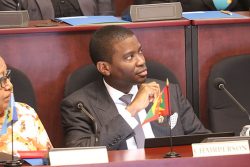(Jamaica Gleaner) Chairman of the Digicel Group Denis O’Brien says recent uncertainties around taxation have impacted the level of foreign direct investment in Jamaica and will drive away investors from the island.
At the same time, he said, notwithstanding its foray into the hospitality industry in Haiti, the telecommunications outfit will not be entering the local tourism sector.
O’Brien, addressing guests at the official opening of the Group’s headquarters in downtown Kingston last week, said “foreign direct investment depends on certainty, and recent uncertainties around taxation have undoubtedly impacted the level of foreign direct investment in Jamaica.”
He added that “this needs to be addressed … as a predictable environment is a prerequisite to attracting further foreign direct investment.”
Last month, the Government announced a raft of revenue measures aimed at raising an additional J$15.9 billion.
Part of the tax measures include an increase in telephone call tax aimed at raising J$1.5 billion, in addition to an effective wholesale tax on calling cards aimed at raising J$200 million.
It followed the introduction of the telephone call tax in May last year.
The telecoms companies argue that new taxation affects their ability to finance debt for upgrade and marketing. The government, however, is relying on increased taxation to meet conditionalities of attaining an International Monetary Fund agreement.
In contrast, the Government has sought to encourage overseas companies to establish their head offices in Jamaica, by amending the Income Tax Act to exempt such companies from the payment of income tax. The bill was passed by both Houses of Parliament last year.
Financial downturn
Jamaica received US$242 million in foreign direct investment in 2011, a 5.8 per cent increase over 2010. But foreign direct investment still trails amounts received prior to the financial downturn in 2008, according to the latest World Investment Report of the United Nations Conference on Trade and Development.
In so far as the hospitality business is concerned, the Digicel Group is building a hotel in Haiti, but said those plans will not be replicated in Jamaica.
“Look, your tourism sector has many, many good operators here,” said O’Brien. “That is not our business. I will leave that to (Gordon) ‘Butch’ Stewart and the others,” he said in an interview with Sunday Business at the official opening of the headquarters.
Tourism is a major source of foreign exchange which earns Jamaica some US$2 billion annually.
Digicel’s US$45-million hotel, slated to open in mid-2014, is touted as Haiti’s first four-star-branded hotel. The resort will be owned by Unigestion Holding, a subsidiary of Digicel Group Limited, and managed by Marriott, the telecoms giant announced last November.
Officials say the hotel will create some 200 jobs and will feature 175 rooms. It will be located in the Turgeau area of Port-au-Prince.
“Haiti was a special case. In Port-au-Prince, after the earthquake, they lost 80 per cent of their major buildings. A lot of hotels got damaged,” O’Brien said of the earthquake which caused the deaths of about 250,000 people in January 2010.
Thereafter, the Haitian government asked Digicel to invest in a hotel. “We said, ‘we would do that’,” the chairman said.
However, Jamaica, where Digicel started its telecoms business more than 10 years ago, remains one of the group’s important territories, said O’Brien.
He explained that “the fulcrum of our operations is in Jamaica. It’s where we employ the most … people. It’s our regional headquarters. All our back office is done here. Our information technology support and marketing is all done in Jamaica.”
Digicel Group grew its operating profit by 13 per cent to US$1.08 billion due to subscriber growth, according to year-end financials to March 2012. Revenues for its 30 markets in the Caribbean, Central America and the Pacific increased 14 per cent to US$2.54 billion, and its subscriber base rose 27 per cent to 12.8 million.





